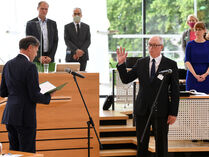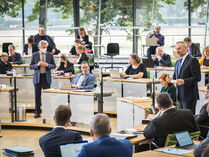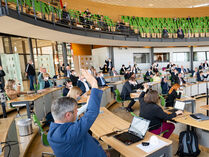What does the State Parliament do?
Passing Laws
The Saxon State parliament decides on all legislation that falls within the jurisdiction of the Free State of Saxony. This includes, for example, schools and education or police law. The members of the State Parliament also adopt the state budget.
Draft laws can be submitted to the State Parliament by the Parliamentary Party Groups, six or more Members of Parliament, the State Government and the people, via a petition initiative.
The decisions of the State Parliament are always made by the plenum, generally in public sessions. The plenum is also the forum for public debate, important political statements by individual Members of Parliament, Parliamentary Party Groups and the State Government.
Electing representatives


Members of the Saxon State Parliament elect their own representatives, such as the President and Vice Presidents of Parliament. They also elect individuals to a number of other posts:
Prime Minister:
One of the most prominent appointments is that of the Prime Minister. The State Parliament elects the Prime Minister through a majority vote in a secret ballot of its members, without debate. The Prime Minister appoints and dismisses State Ministers and State Secretaries, as well as his or her own deputy.
Saxon Constitutional Court:
The State Parliament elects the members of the Saxon Constitutional Court on the basis of a two-thirds majority of its members. The Constitutional Court is a constitutional body with equal status to the State Parliament and State Government. Its responsibilities include deciding how to interpret the Saxon Constitution in disputes between constitutional bodies, and on the compatibility of state laws with the Constitution.
Scrutinising the State Government
The Saxon State Parliament scrutinises the work of the State Government.
A diverse range of instruments and procedures are available to the members of the State Parliament as part of this process, for example:
Minor interpellations:
All members of the State Parliament can put questions to the State Government in written form. These questions must – with a few exceptions – be answered. Minor interpellations are most frequently used by members of the opposition.
Questions to the State Government:
Members have the opportunity during each plenary week to question a member of the State Government in Parliament. The Prime Minister is questioned at least once a year.
Investigation committees:
They are set up on the basis of a motion from one fifth of the members of the State Parliament to investigate specific matters whose clarification is in the public interest.
Articulating opinions


Another important function of the State Parliament is to act as a public political forum of the Free State of Saxony. The aim is to give expression to as wide a range of opinions as possible here so as to contribute to the political decision-making process. The views of the citizens of Saxony should also be voiced in the Saxon State Parliament.
Citizens, pre booked visitor groups and media representatives can observe plenary sessions from the visitors’ gallery (visitor information). The gallery accommodates up to 150 people. The State Parliament can vote by only a two-thirds majority to exclude the public in specific cases.
The lobby in front of the plenary chamber serves as a meeting point for members of parliament, members of the State Government and journalists for discussions and interviews.


